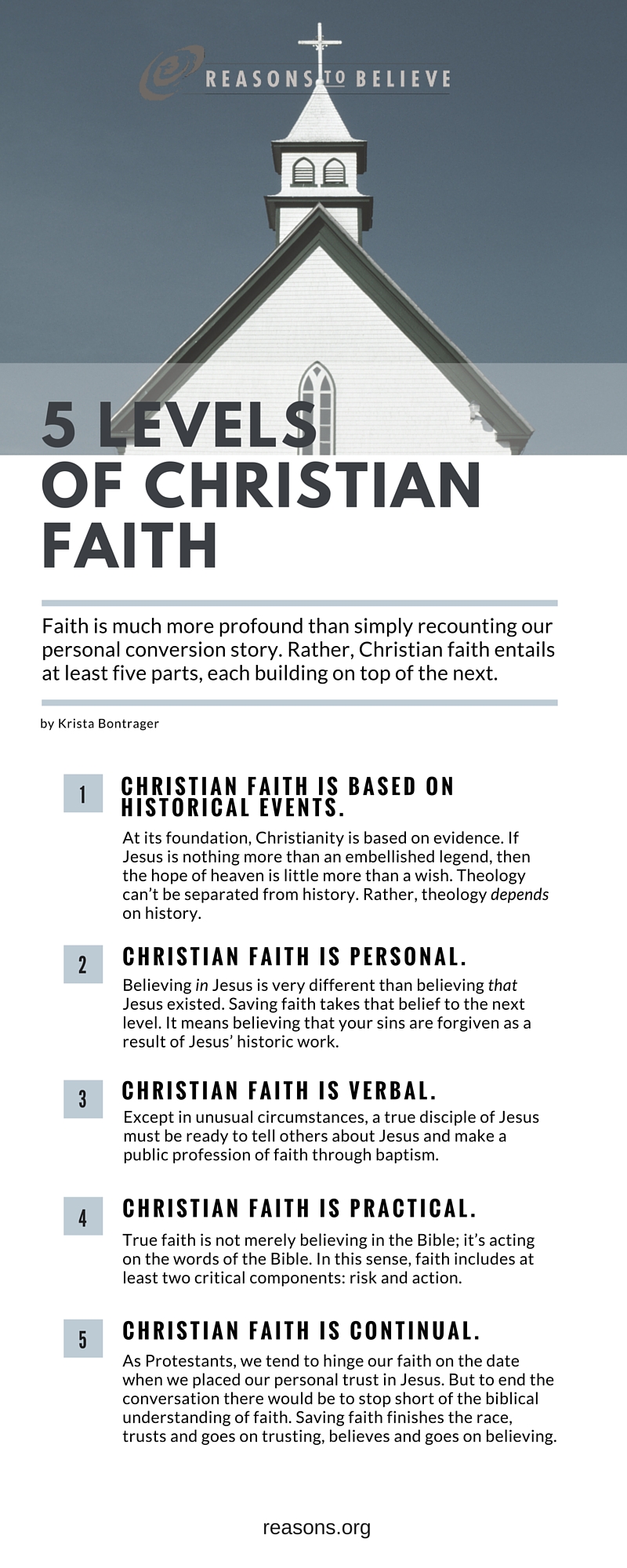5 Levels of Christian Faith
We often use the word “faith” to describe the core of someone’s beliefs—but people of differing religions use the term in very different ways. This has challenged me to more carefully probe the distinctive features of the word “faith” from the perspective of historical Christianity. Faith is much more profound than simply recounting our personal conversion story. Rather, Christian faith entails at least five parts, each building on top of the next.
Level 1: Christian faith is based on historical events.
At its foundation, Christianity is based on evidence. First Corinthians 15 recounts the critical core of Christianity: the resurrection of Jesus of Nazareth. Without Jesus’s resurrection (a historical event), there is no Christianity and no hope for a future in heaven (a theological assertion). If Jesus is nothing more than an embellished legend, then the hope of heaven is little more than a wish. In order for Christianity to be true, it must include a belief in certain historical facts and a belief that the Bible preserves an accurate account of those events. This establishes the identity of Jesus as the resurrected Savior. In this sense, theology can’t be separated from history. Rather, theology depends on history.
Level 2: Christian faith is personal.
Believing “in” Jesus is very different than believing “that” Jesus existed. Someone can believe that the historical events surrounding the life, burial, and resurrection of Jesus are true, but as it says in James 2:19, “Even the demons believe that [God exists]—and shudder.” Saving faith takes that belief to the next level. It means believing in the reality that Jesus’s work on the cross actually applies to you. It’s believing that your sins are forgiven as a result of Jesus’s historic work.
A critical component to this aspect of faith is that each person must put their personal trust in Jesus. In Jesus’s day, the pervading belief among the Jews was that they were saved because of their genetic (physical) connection to Abraham (Matthew 3:9, Luke 3:8). In other words, they thought they were saved primarily because of their ethnic identity. However, Jesus makes it quite clear that faith must be personally applied. This is at the heart of what it means to follow Jesus. As He says, “If anyone comes to me and does not hate father and mother, wife and children, brothers and sisters—yes, even their own life—such a person cannot be my disciple” (Luke 14:26). Just as the ancient Jews could not be saved through their genetic connection to Abraham, neither can a parent’s faith save their child today. Every person must make their own profession of faith based on their own personal decision and connection to Jesus.
Level 3: Christian faith is verbal.
Christianity arose in an oral culture. People processed information primarily through the ear gate (aural) and repeated it through the mouth gate (oral). In contrast, ours is primarily a visual culture. We tend to ingest information through what we see and watch.
The ancient world’s oral tradition provides an important backdrop for our understanding of Scripture. This is why Paul admonishes Timothy not to neglect the public reading of the Scriptures (1 Timothy 4:13). This is also why Paul says in Romans 10:9–10, “If you declare with your mouth, ‘Jesus is Lord,’ and believe in your heart that God raised him from the dead, you will be saved. For it is with your heart that you believe and are justified, and it is with your mouth that you profess your faith and are saved.” Except in unusual circumstances, a true disciple of Jesus must be ready to tell others about Jesus and make a public profession of faith through baptism (Matthew 28:19–20).
Level 4: Christian faith is practical.
According to James 2:17, faith that isn’t accompanied by actions is dead—it is not saving faith. True faith is not merely believing in the Bible; it’s acting on the words of the Bible. In this sense, faith includes at least two critical components: risk and action.
Most Christians in the West don’t need active faith in order to survive. We have doctors, grocery stores, and housing readily accessible. Unlike Christians in developing or impoverished nations, we don’t need to believe in Jesus on a daily basis for His provision of these basic necessities. The Book of Acts is replete with descriptions of the apostles. They didn’t merely believe in Jesus or proclaim their belief verbally. They followed up those statements by doing the things Jesus did: healing the sick, casting out demons, raising the dead, and baptizing new disciples.
The example of the apostles’ faith is challenging. When was the last time you took a risk so big you’d fall on your face if Jesus didn’t come through?
Level 5: Christian faith is continual.
As Protestants, we tend to hinge our faith on a moment in time of salvation, the date when we placed our personal trust in Jesus as Savior and Lord. But to end the conversation there would be to stop short of the biblical understanding of faith. Saving faith finishes the race (Acts 20:24, 2 Timothy 4:7). It overcomes the world (Revelation 3:5). It trusts and goes on trusting. It believes and goes on believing (John 3:16).
It’s not merely a moment of faith that saves, although it would certainly be enough to do so for someone on their death bed (like the thief on the cross). Saving faith involves a lifetime of action that displays the faith. The New Testament contains many warnings about those who do not persevere to the end. Saying the sinner’s prayer is not a magical incantation. It is the doorway to entering a lifetime of obedience and living as a new person (Romans 6–8).
Bringing someone to faith sometimes means helping them weigh the evidence and come to believe in Jesus. Other times, it means helping them learn how to practice their faith. Still others need help building their faith so that it will last. Wherever we are in our journey of faith, the Father truly wants us to abide with Him—to have a personal relationship with Him, for now and for eternity.
Reflections: Your Turn
Where are you in each of these faith “levels”? What does “saving faith” mean to you? Visit Reflections on WordPress to comment with your response.







